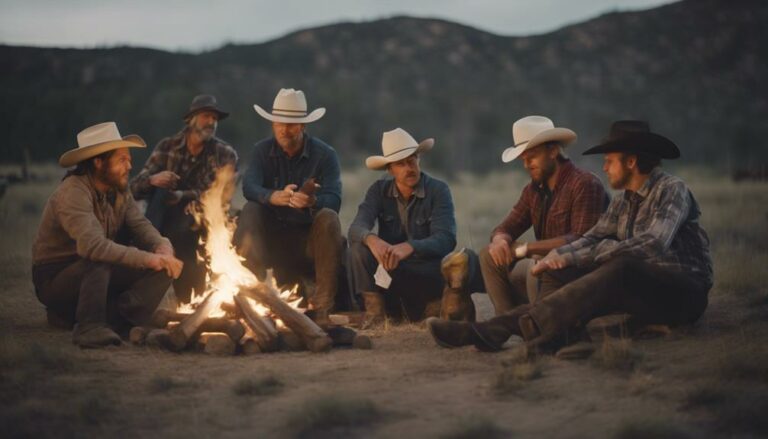Join a vibrant community of ranchers leveraging peer-to-peer networks to enhance ranching practices. Collaborative learning fosters diverse perspectives, innovation, and practical wisdom exchange to tackle operational challenges effectively. By participating in these networks, you can access collective insights, knowledge sharing, and problem-solving discussions that lead to improved grazing techniques and sustainable practices. Discover success stories of increased efficiency, cost savings, and environmental stewardship through peer support. Engage in a culture of continuous improvement and sustainable practices that drive positive change in ranching. Explore how ranchers are building thriving learning networks for regenerative grazing and holistic management approaches.
Key Takeaways
- Diverse group compositions provide varied perspectives for ranchers.
- Collaborative environment fosters open discussions and shared experiences.
- Practical knowledge exchange aids in adapting and improving ranching practices.
- Peer-to-peer learning empowers ranchers to optimize soil health.
- Continuous learning and adoption of new techniques are encouraged within peer networks.
Importance of Peer Learning Networks
Peer learning networks play an essential role in providing valuable support and solutions for ranchers managing the challenges of their operations. Within these networks, ranchers engage in peer-to-peer learning, sharing insights on grazing management practices like regenerative grazing. The diverse group compositions in these networks are paramount as they bring together a variety of perspectives that spark innovative solutions to ranching issues. By fostering a collaborative environment, peer learning networks create a space for ranchers to openly discuss their experiences and learn from one another.
One of the key benefits of these networks is the practical knowledge exchange that occurs. Ranchers can adapt and improve their practices over time by drawing on the collective wisdom of their peers. This adaptability is essential in an ever-changing industry like agriculture. Through peer learning networks, ranchers not only gain valuable insights but also form strong connections with like-minded individuals who share their management goals.
Benefits of Rancher Collaboration
When ranchers collaborate, they leverage collective insights and experiences to tackle a variety of challenges in their operations, fostering growth and innovation within the industry.
Peer collaboration among ranchers brings numerous benefits. By sharing knowledge and experiences, ranchers can address pressing issues like grazing management, soil health, and implementing regenerative practices effectively. Learning networks facilitate the exchange of innovative approaches to overcome ranching challenges. The diverse perspectives within these networks offer fresh insights, encouraging ranchers to think outside the box and adopt new strategies.
Through problem-solving discussions and knowledge sharing, ranchers can collectively enhance their operations and drive sustainable practices forward.
Additionally, the bonding that occurs over shared management goals strengthens relationships within the ranching community, creating a supportive environment for continuous improvement.
Enhancing Grazing Practices Together
Enhancing grazing practices collectively empowers ranchers to optimize soil health and pasture productivity through shared knowledge and innovative strategies. Peer-to-peer learning networks play an important role in promoting regenerative grazing management practices within ranching communities.
By adopting holistic management approaches, such as intense rotational grazing, peer groups assist ranchers in refining their adaptive grazing strategies over time. Managing grazing animals effectively is key to enhancing soil health and pasture productivity on ranches.
Peer groups provide a valuable platform for exchanging diverse viewpoints, experiences, and detailed business insights. Continuous learning and the adoption of new grazing techniques are essential for ranchers to prepare for future challenges and promote the long-term sustainability of their operations.
Through collaborative efforts and a commitment to continuous improvement, ranchers can work together to enhance their grazing practices, benefiting both their businesses and the environment.
Success Stories From Peer Groups
By sharing their experiences and techniques, ranchers in peer groups inspire each other to achieve success in their grazing practices. Peer-to-peer learning in these collaborative discussions leads to innovative problem-solving and improved ranching practices. Here are some success stories from peer groups that highlight the benefits of this supportive environment for sustainable ranching:
- Increased Efficiency: Ranchers sharing time management strategies saw a significant increase in productivity on their land.
- Improved Grazing Techniques: Through peer networks, ranchers learned about rotational grazing methods that enhanced their land management practices.
- Cost Savings: Collaborative discussions on cost-effective solutions resulted in reduced expenses for ranchers, leading to more sustainable operations.
- Environmental Stewardship: By exchanging ideas on sustainable practices, ranchers in peer groups collectively worked towards better land conservation and biodiversity.
These success stories showcase how peer groups play an essential role in fostering a culture of continuous improvement and support in the ranching community.
Sustainable Practices Through Peer Support
Peer support networks among ranchers foster a culture of sustainable practices through shared knowledge and collaborative problem-solving. By engaging in peer support networks, ranchers can exchange insights on conservation practices, cattle management, and innovative solutions for sustainable ranching. The diverse viewpoints within these networks contribute to a rich tapestry of ideas that enhance problem-solving capabilities. Through collaborative discussions, ranchers can refine their land management practices, leading to continuous improvement in their sustainability efforts.
Peer support networks offer a platform for ranchers to learn from each other's experiences, successes, and challenges. By tapping into the collective wisdom of the group, individuals can adapt their practices to align with emerging trends and best practices in sustainable ranching. These networks serve as a catalyst for driving positive change within the ranching community, promoting the adoption of environmentally friendly and economically viable practices. Through peer-to-peer interactions, ranchers can collectively work towards a more sustainable future for their operations and the land they steward.
Conclusion
To sum up, peer learning networks among ranchers are invaluable for sharing knowledge, improving practices, and fostering sustainability in the industry. The benefits of collaboration are endless, from enhancing grazing techniques to creating a supportive community.
By joining forces with fellow ranchers, you can achieve remarkable growth and development in your operations. So, don't hesitate to reach out and connect with your peers – together, you can move mountains in the world of ranching.

